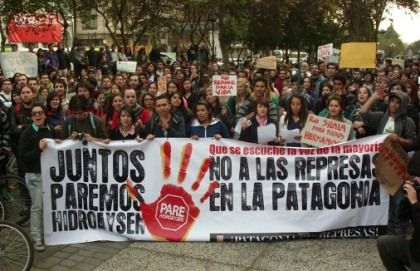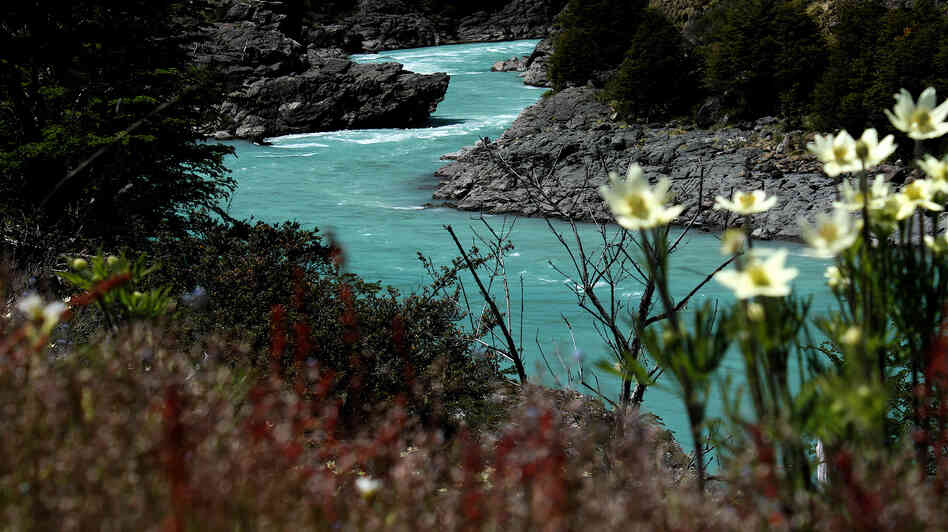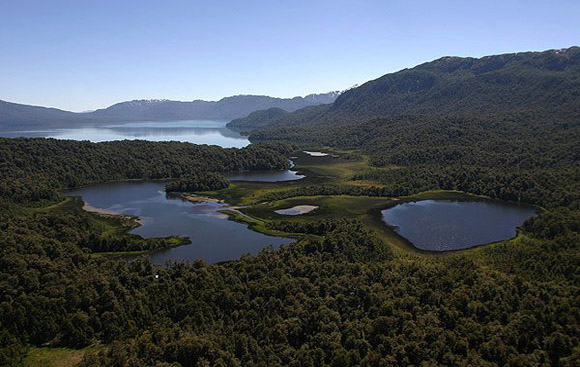Judi Lynn
Judi Lynn's JournalHacker in clandestine wiretapping case had alleged ties to Colombia police officials
Hacker in clandestine wiretapping case had alleged ties to Colombia police officials
Jun 13, 2014 posted by Philip Acuña
The suspect arrested in Colombia’s most recent wiretapping scandal allegedly met with high ranking police officials numerous times before he was detained by authorities May, El Tiempo national newspaper reported on Thursday.
Former Bogota Police commander, Gen. Luis Eduardo Martinez, and the director of Police Intelligence, Col. Jorge Luis Vargas, will appear before the country’s Prosecutor General’s Office (PGO) to explain their alleged connection to Andres Sepulveda, a hacker who was caught spying on the Colombian government’s peace negotiations with the rebel group FARC.
Sepulveda was arrested on May 6 after agents from the Prosecutor General’s technical investigation team (CTI) raided an apartment in northern Bogota, where they discovered surveillance equipment used to intercept electronic communications.
The suspect was allegedly in possession of classified military intelligence including information about the government’s ongoing peace negotiations with the FARC guerrilla group in Cuba, and lists of demobilized guerrilla combatants. Soon after Sepulveda’s arrest, it was discovered that he had recently been employed by the campaign of presidential candidate, Oscar Ivan Zuluaga, to assist with “information security.”
More:
http://colombiareports.co/hacker-sepulveda-alleged-ties-colombia-police-officials/
NAFTA, Insecurity, Power Vacuums and Violence in Rural Mexico
NAFTA, Insecurity, Power Vacuums and Violence in Rural Mexico
Escrito por Victor M. Quintana | 31 / May / 2014
If the fields are burning, it is not only due to the “bad guys”–the drug cartels, hit men and thugs and much less to the self-defense forces, community police groups or farmers defending their territories. Rural Mexico is experiencing a crisis in human security and criminal violence is not the only factor present or even the main cause. The drastic transformation of public policies towards the agricultural sector, induced by structural adjustment programs and trade liberalization, of which the North American Free Trade Agreement (NAFTA) is the cornerstone, created the conditions for the emergence of multiple forms of violence in Mexican countryside.
The adjustment policies and NAFTA have contributed to deterioration of the diverse forms of security that constitute human security. They have generated power vacuums in government and society and have given rise to the many forms of violence seen today in the countryside.[1]
1.NAFTA has eroded human security in the countryside
The United Nations Development Program defines human security as constituted by seven components: economic security, food security, health security, environmental security, community security and political security.[2]
Economic insecurity
At a macro level, NAFTA made the economy of the country’s agrifood sector more vulnerable. From NAFTA’s first year, 1994 until 2000, the primary sector grew only 1.8% and the agrifood sector 2.6% , while the general national economy had an average growth rate of 3.4%.[3]
During the PAN administrations from 2000 through 2012, the GDP of the primary sector saw an average growth of 1.4% (agriculture 1.4%, animal husbandry 1.8% and fishing 0%) while the national economy grew at a rate of 2.1%. The role of agriculture in the national GDP has been decreasing: in 1994 it comprised 6% of the total GDP, and in 2012 it had dropped to 3.57%.
More:
http://www.cipamericas.org/archives/12226
The La Penca, Nicaragua Bombing Remembered 30 Years Later
The La Penca, Nicaragua Bombing Remembered 30 Years Later
Norman Stockwell 30 May 2014
May 30th is "The National Day of the Journalist" in Costa Rica. This day was first proclaimed in 2010 by then-President Óscar Arias Sánchez (the architect of the 1987 Central American Peace Accord called Esquipulas II) to honor the dead and wounded in a bombing that took place in La Penca, just across the northern border inside Nicaragua on May 30th, 1984. Four people were killed, and more than 15 others severely wounded (some so seriously as to lose eyes or limbs) during a press conference called by guerilla leader Edén Pastora Gomez. On the anniversary of the bombing, here is a look back on what happened that day, its impact on the lives of those who were there, and the unanswered questions that remain.
Almost immediately after the July 1979 victory of the Sandinista revolutionary forces in Nicaragua, a counter-revolution began to take shape. Initially made up mostly of former National Guard forces and those allied to the ousted Somoza government, the rebel forces began to change as some pro-Sandinista Nicaraguans became disillusioned with the direction their new government was heading. Perhaps the most prominent of these was Edén Pastora, a charismatic figure who broke from the FSLN (Sandinista Front for National Liberation) and moved to open a southern front of opposition in the jungle area along the border with northern Costa Rica. By May of 1984, Pastora was being pressured to merge with the northern Contra forces based out of Honduras. He refused and called a press conference at his jungle base in La Penca, just along the Nicaraguan border on the Rio San Juan. It was during this press conference that a bomb was detonated in an assassination attempt on Pastora's life.
Three journalists were killed that day, Costa Ricans Jorge Quirós of cameraman for Canal 6 TV, and his assistant, Evelio Sequeira, and US reporter Linda Frazier of the Tico Times. Her husband Joe Frazier who was then Chief Central America Correspondent for the Associated Press, remembers that day: "I happened to be in (Managua) Nicaragua on other business… I'd come back from dinner…And I got to the Intercontinental Hotel, and the clerk whom known for many years, since the ‘79 revolution said ‘Señor Frazier, there's been a...there's been an explosion on the San Juan River. You need to know this’… And I started asking around… calling everybody I knew in Costa Rica, sort of calling in every favor I had out there, and I was getting a little panicky. And finally, I got a radio broadcast - someone had gone up live on the San Juan where the boats were coming back from La Penca, describing what was going on, and one of them said ‘well, there's a red-head foreign lady here who's a correspondent and she is sin vida, without life.’ And I knew then it had to be...there's no way it was anybody else. ..I realized that in the morning I had to go back to Costa Rica and tell our ten-year-old son what had happened and that's something I don't wish on anybody."
Costa Rican journalist Nelson Murillo, now retired, was a few feet away, asking Pastora a question when the bomb exploded, he said: "I ended up burnt, injured, fractured, I was two months in physical therapy in the hospital… I was left with one shorter leg, progressive deafness, PTSD and spinal problems because of the shortening of the leg. I’ve already had 30 surgeries because of problems beginning in La Penca, they took 70 shrapnel pieces out of me, metallic pieces of the bomb; since it was homemade it had everything: screws, BBs, thumb tacks, etc. It’s been a pilgrimage through the hospitals over 30 years. But there were people with amputations, Don Roberto Cruz, who died 19 years after the bombing of La Penca, lost an eye, and ear, and one leg. Out of those of us left, the present day survivors, (there were others with amputations and deformations and other serious problems that have over time died from natural causes), but of those surviving today, I am the one left with the most serious health problems."
More:
http://www.towardfreedom.com/31-archives/americas/3554-the-la-penca-nicaragua-bombing-remembered-30-years-later
3 men detained for participating in slaying of anthropologist during Guatemala's civil war
3 men detained for participating in slaying of anthropologist during Guatemala's civil war
By The Associated Press June 10, 2014

[font size=1]
FILE - In this undated file photo released by the Mirna Mack Foundation, Guatemalan anthropologist Myrna Mack is seen in an
unknown location. Mack, who worked with a group that had accused the army of human rights violations, was killed on Sept.
11, 1990 by attackers in broad daylight on the sidewalk outside her downtown office in Guatemala City. Police announced on
Tuesday, June 10, 2014 that two men were arrested on Tuesday in connection with her murder.
(AP Photo/Fundacion Mirna Mack, File)[/font]
GUATEMALA CITY - Guatemalan authorities on Tuesday detained three men accused of participating in the killing of an anthropologist who documented human rights violations during Guatemala's civil war.
National Police spokesman Pablo Castillo said the men were detained in the slaying of Myrna Mack, who was stabbed to death outside her Guatemala City office in 1990.
Castillo says David Lopez Aguilar, Jose Miguel Gonzales Grijalba and Alberto Encarnacion Barrios Rabanales were arrested in the provinces of Guatemala and Jutiapa.
According to court documents, Lopez Aguilar, a 50-year-old former police officer, was in charge of the initial investigation into Mack's killing. Authorities say Gonzales Grijalba is 49 years old but gave no other information about him or Barrios Rabanales.
The Myrna Mack Foundation, created after Mack's death, said in a statement that the Tuesday arrests are related to the slaying of Jose Merida Escobar, a police investigator who determined the anthropologist's killing had been ordered by the government. Merida Escobar was killed in 1991, shortly after revealing his findings to a court.
More:
http://www.canada.com/news/detained+participating+slaying+anthropologist+during+Guatemalas/9925673/story.html
Mexico boasts a staggering genetic diversity, study shows
Mexico boasts a staggering genetic diversity, study shows
By Geoffrey Mohan
t▼
DNA offers a nuanced answer to what it means to be Mexican
t▼
Ancient genetic signal survived conquest in Mexico
t▼
Latino and Hispanic labels don't do justice to Mexico's genome
June 12, 2014 4:14PM
Writers, artists and historians have long pondered what it means to be Mexican. Now science has offered its answer, and it could change how medicine uses racial and ethnic categories to assess disease risk, testing and treatment..
The broadest analysis of the Mexican genome ever undertaken reveals a nation of staggering genetic diversity, where European conquest only thinly masks the ancestral DNA of Native Americans, and where some populations remain as distinct from one another as Europeans are from Chinese, according to findings published Thursday in the journal Science.
Forty researchers, who share Latino heritage as well as professional qualms over the significance of ethnic and racial categories, teamed up across borders to analyze more than 1 million variations in the building blocks of DNA. They examined more than 500 samples collected in Mexico’s remote Indian villages and polyglot cities, and from Mexican Americans in California.
“Because these populations are so rich, so genetically differentiated, you can’t just lump them all in,” said lead investigator Carlos Bustamante, a population geneticist and co-director of Stanford University’s Center for Computational, Evolutionary and Human Genomics. “You really have to embrace that diversity and think about doing medical genetic studies on a very large scale.”
More:
http://www.latimes.com/science/la-sci-mexico-dna-20140613-story.html
Victims call for investigation of another former general linked to paramilitary massacre
Victims call for investigation of another former general linked to paramilitary massacre
Jun 11, 2014 posted by Victoria McKenzie
The lawyer representing victims of a notorious 1997 paramilitary massacre in central Colombia is asking for the investigation of another former general in connection with the murders, Rito Alejo del Río, national media reported Wednesday.
One day after the Supreme Court sentenced Jaime Humberto Uscategui to 37 years in prison for his responsibility in the Mapiripan massacre in central Colombia, a lawyer called on the Supreme Court to investigate former general Rito Alejo del Rio for his involvement in the same incident, reported La Vanguardia Wednesday.
Eduardo Carreno, representing the victims of Mapiripan, said that Del Rio should be investigated for his “actions of omission in this slaughter, having worked with paramilitaries and facilitated their movements out of the Necocli and Apartado airports…. in two planes.”
Del Rio, who was the commander of the Colombian army’s 17th Brigade and in charge of the northwestern Uraba region, is currently serving a 25-year sentence for the murder and dismemberment of a village leader during a joint military-paramilitary operation in Choco in 1997.
More:
http://colombiareports.co/colombia-general-sentenced-37-years-prison-1997-massacre/
(My emphasis.)
New charges brought against Zuluaga ‘peace talks hacker’
New charges brought against Zuluaga ‘peace talks hacker’
Jun 11, 2014 posted by Victoria McKenzie
New evidence suggests that Andres Sepulveda’s wiretapping operation was much more extensive than originally suspected, Colombia media reported on Wednesday.
A day after his re-arrest, new charges were brought against presidential candidate Oscar Ivan Zuluaga’s former campaign worker, Andres Sepulveda, who was originally arrested for illegally wiretapping government dialogues with the FARC in Havana, according to reports by Semana Magazine.
MORE: Prosecutors arrest Zuluaga ‘peace talks hacker’ less than 24 hours after release
The new charges brought before the Prosecutor General’s Office on Wedndesday include aggravated conspiracy, aggravated abusive access to a computer system, using malicious software, violation of personal information, and espionage.
The prosecution exhibited evidence at Wednesday’s hearing indicating that Sepulveda worked with others to infiltrate a number of Colombian national databases and had the “objective” of infiltrating the computer systems of Central American governments as well, including Nicaragua.
More:
http://colombiareports.co/zuluaga-peace-talks-hacker-wiretapped-international-embassies-prosecution/
Colombian paramilitary financier says Uribe extradited him to keep quiet about regime’s paramilitary
Source: Colombia Reports
Colombian paramilitary financier says Uribe extradited him to keep quiet about regime’s paramilitary ties
Jun 11, 2014 posted by Nicolas Bedoya

[font size=1]Juan Carlos el "Tuso" Sierra (Photo: Semana) [/font]
A former Colombian drug trafficker and paramilitary financier declared that former Colombia President Alvaro Uribe extradited him to the US to shut him up about disclosing information about high-ranking officials with paramilitary ties, according to an interview with W Radio.
In an exclusive interview with Colombia’s W Radio, Juan Carlos Sierra, alias “El Tuso,” said that he was double-crossed by Uribe and was extradited by his administration in order to silence him from speaking-out about the regime’s alleged paramilitary ties.
“I was extradited to not tell the truth,” said Sierra, and since then his case has been politicized.
In the interview, Sierra declared that several companies, businessmen, politicians, and military officials were intimately involved and supportive of the paramilitaries.
Sierra was clearly apprehensive and refused to name specific companies and businessmen because of “limits to what he could say,” but he did mention, ”We met many people from the Armed Forces of which we were in contact and received help in exchange for money.”
Read more: http://colombiareports.co/paramilitary-financier-says-uribe-extradited-keep-quiet/
(My emphasis.)
Chile rejects huge hydro-electric project in Patagonia
Source: BBC News
10 June 2014 Last updated at 13:47 ET
Chile rejects huge hydro-electric project in Patagonia
The Chilean government has rejected what would have been the biggest energy project in the country's history.
The HidroAysen project would have seen five huge dams built on two rivers in a beautiful part of Patagonia.
"This project has many aspects that were poorly thought out," said Energy Minister Maximo Pacheco.
Environmentalists celebrated the decision, saying the project would have had a devastating impact on the area's ecosystem.
"These giant dams would have put at risk the wilderness, traditional culture, and local tourism economy of this remarkable region," said Amanda Maxwell, Latin America project director at the Natural Resources' Defence Council.
Thousands of people had protested against the HidroAysen project.
Environment Minister Pablo Badenier said HidroAysen had made insufficient provision for those who would have been displaced, and the quantification of damage to the environment and wildlife were inadequate.
Read more: http://www.bbc.com/news/world-latin-america-27788286
[center]







The people of Chile have been struggling so hard for years to save this beautiful land. [/center]
Japan Prime Minister's Plan: 'Kill the Whales'
Source: Common Dreams
Published on Tuesday, June 10, 2014 by Common Dreams
Japan President's Plan: 'Kill the Whales'
Shinzo Abe's plan to resume commercial whaling called "rubbish" and "senseless"
- Jon Queally, staff writer
Despite the international ban that took hold in 1986 and years of ensuing controversy over its "scientific" hunting, president of Japan Shinzo Abe has sparked outrage across the world by announcing his intent to restart the nation's commercial whaling industry.
"I want to aim for the resumption of commercial whaling by conducting whaling research in order to obtain scientific data indispensable for the management of whale resources," Abe told a parliamentary commission on Monday. "To that end, I will step up efforts further to get understanding from the international community."
Since the international ban, governed by the International Whaling Commission (IWC), went into effect nearly three decades ago, Japan has been allowed to hunt select whale species within its territorial waters and conduct what are categorized as "research" whaling hunts in international waters, done mostly in the South Pacific and Southern Ocean.
Abe's comments to revitalize a true return to industrial whaling, however, was met with immediate condemnation by conservationists and governments.
Read more: http://www.commondreams.org/headline/2014/06/10-0
Profile Information
Member since: 2002Number of posts: 160,527